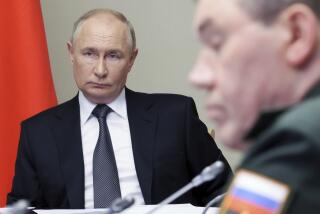General Tries to Soothe Kurds as Troops Leave
- Share via
ZAKHU, Iraq — Allied troops streamed out of northern Iraq on Sunday as a U.S. general tried to soothe Kurdish fears of being left exposed to the wrath of Iraqi leader Saddam Hussein.
Maj. Gen. Jay Garner said an allied strike force to be based in southeast Turkey will have plenty of warning bells if the Iraqi strongman threatens the Kurds again.
“Through individuals, NGOs (non-governmental organizations), the U.N. and the press, there are more than enough eyes,” he said.
Weekly U.S.-Iraqi military coordination meetings will take place in this Iraqi border town after allied troops complete their pullout today, he told reporters.
Coalition officials confirmed that the strike force will be based at Silopi just north of the border, with units at Batman, 87 miles to the northwest, and Incirlik in southern Turkey.
It will have up to 3,000 troops--American, French, British and Dutch--backed by helicopters and combat planes.
Garner said Iraqi secret police will not enter the former security zone because they could not operate without support from Iraqi troops, banned from the region by the allies.
He said allied commander U.S. Lt. Gen. John M. Shalikashvili has told the Iraqis they will be allowed to station a small number of customs men at the border.
Washington has said no Iraqi army, secret police or military border guards may enter the security zone. Iraqi aircraft may not fly north of the 36th Parallel, well to the south.
Garner said he had no news on autonomy talks in Baghdad between Kurdish rebel leaders and President Hussein.
“Our movement is not linked with the talks,” he said, referring to the coalition withdrawal from northern Iraq.
Many Kurds expect an autonomy agreement to be announced by July 17, Iraq’s national day.
About 500 Kurds gathered near Zakhu on Sunday to say farewell to the Western troops who have shielded them from Hussein.
Garner traded his cap for a checkered Kurdish head-dress and rode with Kurdish guerrilla leaders on a jeep past Kurds who chanted “Yes, yes Bush; No, no Saddam.”
The allies moved into northern Iraq after 2 million Kurds fled to the rugged borders of Turkey and Iran in March and early April to escape Iraqi troops who crushed post-Gulf War revolts against Hussein.
Thousands died of wounds, disease and cold during and after their escape to remote peaks where they huddled for weeks. Most of the survivors returned after the allies set up safe havens.
About 3,000 allied troops were still in northern Iraq on Saturday, down from a peak of 12,000 in May.
A U.S. spokesman at Incirlik, Maj. John Curd, said about 1,000 were leaving Sunday and the rest today.
Sunday’s farewell scenes contrasted with a protest the previous day by up to 3,000 Kurds who blocked a border bridge for four hours to show their anger at the coalition withdrawal.
More to Read
Sign up for Essential California
The most important California stories and recommendations in your inbox every morning.
You may occasionally receive promotional content from the Los Angeles Times.













